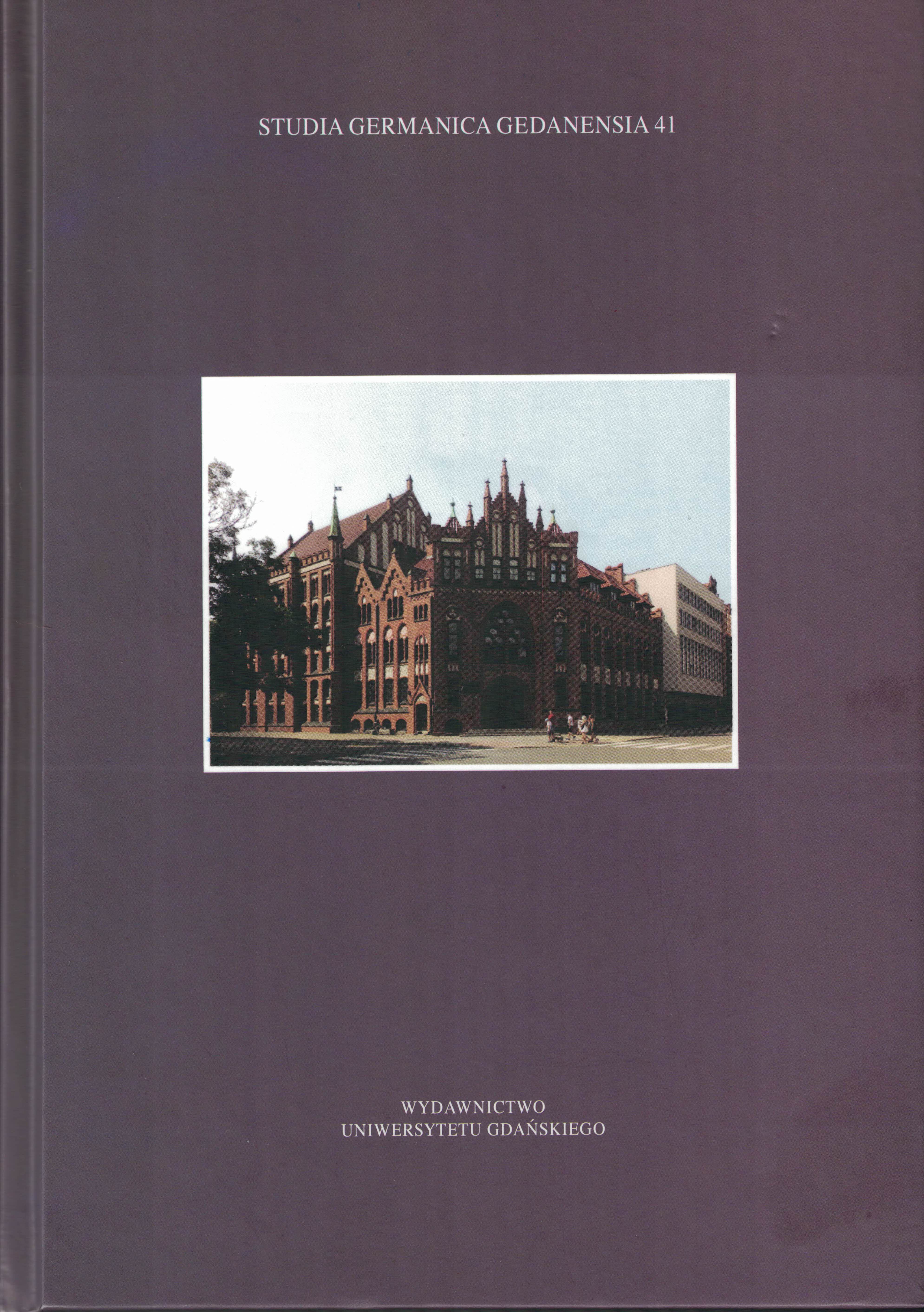Zu der reportativen Evidentialität und information transfer in polnischen Formen mit "mieć" und Partizipien der verba dicendi
DOI:
https://doi.org/10.26881/sgg.2019.41.09Słowa kluczowe:
mieć-Konstruktionen, reportative Modalität, verba dicendi, PossessivitätstransferAbstrakt
In dem Beitrag wird eine spezifische Gruppe der polnischen mieć-Konstruktionen mit Partizipien der verba dicendi einer eingehenden synchronen Studie unterzogen. Die eruierten Formen mit mówić//powiedzieć, za-/nakazywać//za-/nakazać und wpajać//wpoić werden nicht nur auf der Folie ihrer „quasi passivischen” Interpretation, sondern auch vor dem Hintergrund der extensions im TAM-Gefüge erwogen, indem Sätze wie mam powiedziane/mamy zakazane/mamy wpojone im Sinne grammatischer Ausdrücke der reportativen Modalität interpretiert werden. Darüber hinaus werden ihre grundlegenden ereignisstrukturellen und rollensemantischen Eigenschaften angesprochen. Den ganzen hier nur skizzierten Kontext rundet die These ab, dass Informationswiedergabe eine Art des Possessivitätstransfers ist.
Downloads
Bibliografia
Abraham, Werner (2005): Event arguments and modal verbs. In: Maienborn, Claudia / Wöllstein, Angelika (eds.): Event Arguments: Foundations and Applications. Tübingen: Niemeyer, 243–277.
Abraham, Werner / Leiss, Elisabeth (2012): Theory of mind elements across languages. In: Abraham, Werner / Leiss, Elisabeth (eds.): Modality and Theory of Mind across Languages, Berlin: de Gruyter, 1–37.
Abraham, Werner / Piskorz, Jadwiga (2014): A rare case of covert modality. Spoken Polish and the novel periphrastic past with mieć ‘have’. In: Abraham, Werner / Leiss, Elisabeth (eds.): Modes of Modality: Modality, typology, and universal grammar. Amsterdam, Philadelphia: John Benjamins, 409–456.
Bartelik, Piotr (2018): Zu der Ereignis-und Argumentstruktur der ein- und dreistelligen Verben in polnischen Präteritum-Formen vs. ‘neueren’ Formen mit mieć. In: Studia Germanica Wratislaviensia 143, 103–118.
Bhatt, Rajesh (2000): Covert Modality in non-finite contexts. Ph.D. thesis University of Pennsylvania Scholarly Commons, https://repository.upenn.edu/cgi/viewcontent.cgi?article=1033&context=ircs_reports [1.08 2018].
Bunčić, Daniel (2015): “To mam wpajane od dziecka” – a recipient passive in Polish? In: Zeitschrift für Slawistik 60 (3), 411–431.
Comrie, Bernard (1976): Aspect: An Introduction to the Study of Verbal Aspect and Related Problems. Cambridge: University Press.
Glatz, Daniel (2001): Zur Ereignisstruktur von Kommunikationsverben. In: Harras, Gisela (Hg.): Kommunikationsverben. Konzeptuelle Ordnung und semantische Repräsentation. Tübingen: Narr, 33–61.
Goldberg, Adele (2005): Argument realization: The role of constructions, lexical semantics and discourse factors. In: Östman, Jan-Ola / Fried, Mirjam (eds.): Construction Grammars: Cognitive Grounding and Theoretical Extensions. Amsterdam: John Benjamins, 17–43.
Greń, Zbigniew (1994): Semantyka i składnia czasowników oznaczających akty mowy w języku polskim i czeskim [Zur Semantik und Syntax der Verben, die Sprechakte im Polnischen und Tschechischen bezeichnen]. Warszawa: SOW.
Hansen, Björn (2001): Das Modalauxiliar im Slavischen. Semantik und Grammatikalisierung im Russischen, Polnischen, Serbischen/Kroatischen und Altkirchenslavischen. München: Sagner.
Harras, Gisela / Winkler, Edeltraud / Erb, Sabine / Proost, Kristel (2007): Handbuch deutscher Kommunikationsverben. Teil 2: Lexikalische Strukturen. Berlin: de Gruyter.
Hegarty, Michael (2006): Information update and covert modality in the semantics of propositional attitude verbs. In: Butt, Miriam (ed.): Proceedings of KONVENS 2006 (Konferenz zur Verarbeitung natürlicher Sprache), 174–180, https://kops.uni-konstanz.de/handle/123456789/3739 [1.08. 2018].
Kątny, Andrzej (1999): Zu Zustandskonstruktionen mit mieć [haben] im Polnischen und ihren Entsprechungen im Deutschen. In: Kątny, Andrzej / Schatte, Christoph (Hg.): Das Deutsche von innen und von außen. Poznań: Wyd. Naukowe UAM, 97–106.
Kątny, Andrzej (2010): Zu Resultativ und Modalverben in epistemischer Lesart aus kontrastiver Sicht. In: Kątny, Andrzej / Socka, Anna (Hg.): Modalität/Temporalität in kontrastiver und typologischer Sicht. Frankfurt/M.: Peter Lang, 59–77.
Kotin, Michail (2012): Modalitäten. In: Zeitschrift des Verbandes Polnischer Germanisten. H. 2, 140–158.
Leiss, Elisabeth (2012): Epistemicity, Evidentiality, and Theory of Mind (ToM). In: Abraham, Werner / Leiss, Elisabeth (eds.): Modality and Theory of Mind across Languages. Berlin: de Gruyter, 37–67.
Lindstedt, Jouko (2000): The perfect – aspectual, temporal and evidential. In: Dahl, Östen (ed.): Tense and aspect in the languages of Europe. Berlin/New York: de Gruyter, 365–385.
Levin, Beth / Rappaport Hovav, Malka (2011a): Conceptual Categories and Linguistic Categories I: Introduction, https://web.stanford.edu/~bclevin/lsa11intro.pdf [1.08. 2018].
Levin, Beth / Rappaport Hovav, Malka (2011b): Conceptual Categories and Linguistic Categories VI: A Crosslinguistic Verb-sensitive Approach to Dative Verbs, https://web.stanford.edu/~bclevin/lsa11dat.pdf [1.08.2018].
Piskorz, Jadwiga / Abraham, Werner / Leiss, Elisabeth (2013): Doppelter Grammatikalisierungszyklus und funktionale Universalgrammatik. Am Beispiel des analytischen Perfekts und des Präteritums in der Sprachgeschichte im Polnischen. In: Die Welt der Slaven LVIII, 276–307.
Proost, Kristel / Glatz, Daniel (2000): Semantic and syntactic properties of verbs of communication. In: Heid, Ulrich / Evert, Stefan / Lehmann, Egbert / Rohrer, Christian (eds.): Proceedings of the Ninth EURALEX International Congress, EURALEX 2000, Stuttgart, Germany, August 8th – 12th, 2000, vol. 2. Stuttgart: IfMS, 693–698.
Proost, Kristel (2007): Speech Act Verbs. In: Keith, Allan (ed.): Concise encyclopedia of semantics. Amsterdam: Elsevier, 912–917.
Rappaport Hovav, Malka / Levin, Beth (1998): Building verb meanings. In: Butt, Miriam / Geuder, Wilhelm (eds.): The Projection of Arguments: Lexical and Compositional Factors. Stanford: CSLI Publications, 97–134.
Sawicki, Lea (2011): The perfect-like construction in colloquial Polish. In: Zeitschrift für Slawistik 56, 66–83.
Schäfer, Martin (2018): The argument structure of abstract verbs with manner/result readings, http://linguistics.huji.ac.il/IATL/27/Abstracts/Martin_Schaefer.pdf [1.08 2018].
Speas, Margaret (1990): Phrase structure in natural language. Dordrecht: Springer.
Wiemer, Björn (2017): Slavic Resultatives and Their Extensions: Integration into the Aspect System and the Role of Telicity. In: SLAVIA. Časopis pro slovanskou filologii 86/2–3, 124–168.
Wiemer, Björn (2018): Evidentials and Epistemic Modality. In: Aikhenvald, Alexandra (ed.): The Oxford Handbook of Evidentiality. Oxford: Oxford University Press, 85–109.
Winkler, Edeltraud (2001): Möglichkeiten der semantischen Dekomposition von Kommunikationsverben. In: Harras, Gisela (Hg.): Kommunikationsverben. Konzeptuelle Ordnung und semantische Repräsentation. Tübingen: Narr, 61–77.
Zeman, Sonja (2014): (C)Overt epistemic modality and its perspectival effects on the textual surface. In: Abraham, Werner / Leiss, Elisabeth (eds.): Modes of Modality: Modality, typology, and universal grammar. Amsterdam: John Benjamins, 457–484.
Pobrania
Opublikowane
Jak cytować
Numer
Dział
Licencja
Prawa autorskie (c) 2023 Piotr Bartelik

Utwór dostępny jest na licencji Creative Commons Uznanie autorstwa – Użycie niekomercyjne – Bez utworów zależnych 4.0 Międzynarodowe.
Copyright by Instytut Filologii Germańskiej, Wydawnictwo Uniwersytetu Gdańskiego.

 Uniwersyteckie Czasopisma Naukowe
Uniwersyteckie Czasopisma Naukowe




